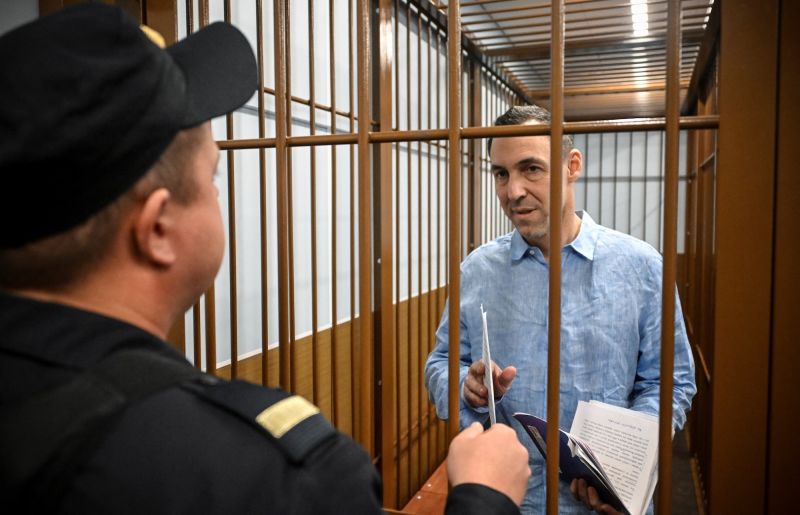French researcher Laurent Vinatier was found guilty by a Moscow court on Monday of breaking Russia’s “foreign agent” laws and sentenced to three years in prison.
Vinatier, 48, is one of several Westerners to have been charged under Russian security laws at a time of tense confrontation between Moscow and the West over the war in Ukraine. The judge ignored a plea by the defense to fine him instead of jailing him.
In a speech to the court before he was sentenced, Vinatier said he loved Russia, apologised for breaking the law, and even recited a verse by Russian poet Alexander Pushkin.
Wearing a blue open-necked shirt and jeans, he stood behind metal bars and listened intently as the judge rattled off the verdict. He was blinking rapidly but did not show any visible emotion.
A longtime researcher on the former Soviet Union, he was arrested in June by the FSB security service and accused of failing to register as a foreign agent in Russia while collecting military information of value to foreign intelligence services.
The offence carries a sentence of up to five years, but prosecutors requested a term of three years and three months in recognition of the fact that Vinatier had pleaded guilty.
State news agency RIA said the defence planned to appeal.
France says Vinatier has been arbitrarily detained and has called on Monday for his immediate release. President Emmanuel Macron has denied that Vinatier worked for the French state and has described his arrest as part of a misinformation campaign by Moscow.
“The legislation on ‘foreign agents’ contributes to a systematic violation of fundamental freedoms in Russia, such as freedom of association, freedom of opinion and freedom of expression,” France’s foreign ministry said. “French authorities remain fully mobilized to provide assistance (to Vinatier),” the ministry added.
Vinatier is an employee of the Centre for Humanitarian Dialogue (HD), a Swiss-based conflict mediation organisation. Fellow academics who know him have told Reuters he is a respected scholar involved in legitimate research.
‘A Russian life’
Independent news outlet Mediazona quoted Vinatier as asking the court for forgiveness.
“I am not afraid to say that I fell in love with Russia. This is confirmed by my personal life – my wife is Russian, my friends are Russian. I lived a Russian life and still, even the last four months, I have been living in a Russian atmosphere,” he said, referring to the period since his arrest.
He asked for a “fair and lenient” decision, saying he had children and elderly parents who depended on him, and recited by heart a verse from Pushkin’s poem “If Life Deceives You”.
Under Russian law, people are obliged to contact the justice ministry and register as foreign agents if they are involved in political activity or are collecting military information while receiving financial or other help from abroad.
The FSB said in July that Vinatier had tried to use his numerous contacts with political scientists, sociologists, economists, military experts and government officials to collect military details “that could be used by foreign intelligence services to the detriment” of Russia’s security.
In a statement following his arrest, his employer HD said its staff work globally and “routinely meet with a wide range of officials, experts and other parties with the aim of advancing efforts to prevent, mitigate and resolve armed conflict”.
Russia says relations with France have hit a low since French authorities placed the Russian founder of the Telegram messaging app, Pavel Durov, under formal investigation in August in connection with the use of the platform for crimes such as fraud, money laundering and child pornography. Durov’s lawyer has called the proceedings against him absurd.

